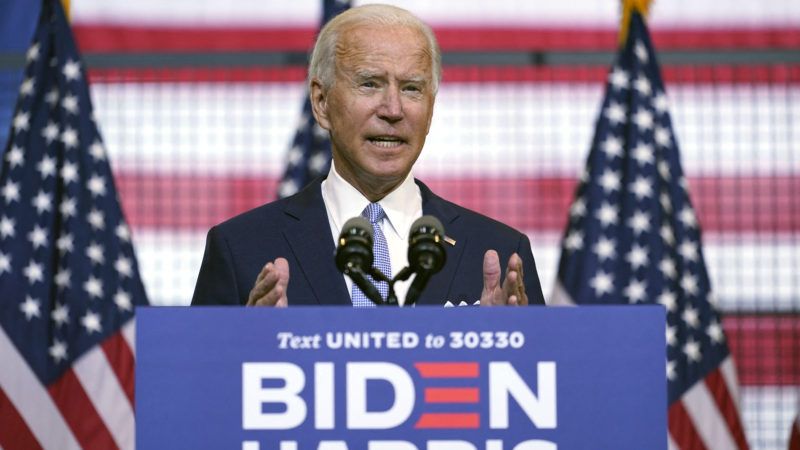Biden Denies He Will Ban Fracking
Parsing the presidential candidate's position

"I am not banning fracking. Let me say that again. I am not banning fracking," declared Democratic presidential candidate Joe Biden in a speech in Pittsburgh yesterday. "No matter how many times Donald Trump lies about me."
He sounded a somewhat different note during a debate back in March. Sen. Bernie Sanders (I–Vt.) declared that he was "talking about stopping fracking as soon as we possibly can. I'm talking about telling the fossil fuel industry that they are going to stop destroying this planet—no ifs, buts, and maybes about it." Biden responded, "So am I." He also said "no new fracking" and "No more drilling on federal lands. No more drilling, including offshore."
After the debate that night, Biden's campaign declared that the candidate had misspoken and had actually meant to just reiterate his policy of "banning new oil and gas permitting on public lands and waters." This would obviously stop any new fracking on those lands, as well as conventional drilling on federal lands and waters. This proposal somewhat mirrors President Barack Obama's December 2016 order banning oil and gas drilling off the Atlantic and Arctic coasts as well as selected federal onshore areas.
The vast majority of U.S. oil and natural gas production takes place on private lands, and so would not be subject to Biden's proposed leasing ban. More specifically, Biden's ban would have no effect on private leasing and production in swing electoral states like Pennsylvania and Ohio.
Production on federal lands and offshore is not insignificant, though. According to a 2018 Congressional Research Service report, about 24 percent of oil and 13 percent of natural gas production occurs on federal lands and offshore.
"Biden has promised to abolish the production of American oil, coal, shale, and natural gas," claimed President Donald Trump in his nomination acceptance speech last week.
Biden's proposed drilling ban on federal lands is clearly an incremental part of his plan to reduce fossil fuel consumption, the aim being to cut the carbon dioxide emissions that contribute to man-made climate change. According to the Democratic Party platform, the U.S. "must achieve net-zero greenhouse gas emissions as soon as possible, and no later than 2050." Given that 2050 deadline, we shouldn't expect him to abolish the fossil fuel industry in the next four years. But neither should we expect a President Biden to be a friend to oil, natural gas, and coal companies.



Show Comments (82)